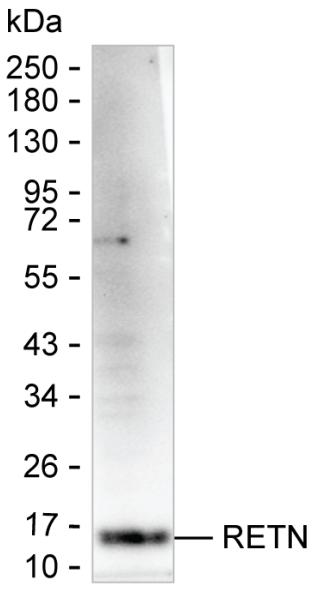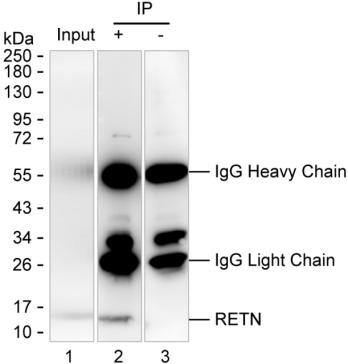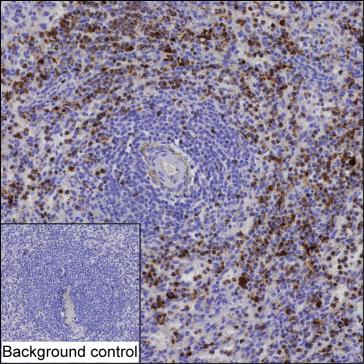


| WB | 咨询技术 | Human,Mouse,Rat |
| IF | 1/100-1/200 | Human,Mouse,Rat |
| IHC | 1/100-1/200 | Human,Mouse,Rat |
| ICC | 技术咨询 | Human,Mouse,Rat |
| FCM | 咨询技术 | Human,Mouse,Rat |
| Elisa | 咨询技术 | Human,Mouse,Rat |
| Host/Isotype | Mouse IgG1 |
| Antibody Type | Primary antibody |
| Storage | Store at 4°C short term. Aliquot and store at -20°C long term. Avoid freeze/thaw cycles. |
| Species Reactivity | Human |
| Immunogen | Purified recombinant fragment of human RETN |
| Formulation | Purified antibody in PBS with 0.05% sodium azide |
+ +
以下是3篇与RETN(Resistin)抗体相关的代表性文献摘要,供参考:
---
1. **标题**: *The hormone resistin links obesity to diabetes*
**作者**: Steppan CM, et al.
**摘要**: 首次报道Resistin作为脂肪细胞分泌的激素,通过抗体检测发现其在肥胖小鼠模型中表达升高,并证实其抑制胰岛素敏感性,提出肥胖-胰岛素抵抗的分子机制关联。
---
2. **标题**: *Resistin release by human adipose tissue explants in primary culture*
**作者**: McTernan PG, et al.
**摘要**: 利用抗体验证人类脂肪组织中Resistin的表达与分泌,发现肥胖和2型糖尿病患者的脂肪组织Resistin mRNA及蛋白水平显著升高,提示其在人类代谢疾病中的潜在作用。
---
3. **标题**: *Resistin is a predictor of cardiovascular events in rheumatoid arthritis*
**作者**: Bokarewa M, et al.
**摘要**: 通过ELISA检测血清Resistin水平,发现其在类风湿性关节炎患者中显著升高,并与炎症标志物(如CRP)及心血管事件风险正相关,提示Resistin抗体在慢性炎症疾病中的诊断价值。
---
4. **标题**: *Circulating resistin in paediatric patients with metabolic syndrome*
**作者**: Burnett MS, et al.
**摘要**: 采用抗Resistin抗体检测儿童代谢综合征患者血清,发现Resistin水平与腰围、胰岛素抵抗指数呈正相关,支持其作为儿童代谢异常的潜在生物标志物。
---
注:以上文献为示例,实际引用时需核对具体年份及期刊来源(如Nature、Diabetes等)。如需更近期研究,可检索PubMed等数据库。
**Background of RETN Antibody**
The RETN antibody targets resistin, a cysteine-rich adipokine encoded by the *RETN* gene. Initially identified in mice as a hormone linking obesity to insulin resistance, resistin in humans exhibits functional differences: murine resistin is secreted by adipocytes, while human resistin is primarily produced by macrophages, monocytes, and bone marrow cells. This cytokine plays roles in insulin resistance, inflammation, and metabolic disorders, with elevated levels associated with type 2 diabetes, cardiovascular diseases, and certain cancers.
RETN antibodies are essential tools for detecting resistin in research and diagnostics. They enable quantification (e.g., ELISA) and localization (e.g., immunohistochemistry) of resistin in tissues or biological fluids, aiding studies on its mechanistic roles in disease pathways. Monoclonal antibodies offer high specificity, while polyclonal antibodies provide broader epitope recognition.
Therapeutic applications are under exploration, with RETN antibodies investigated for blocking resistin's pro-inflammatory or metabolic effects. Challenges include interspecies variability and understanding resistin's pleiotropic signaling pathways. Ongoing research aims to clarify its clinical relevance and potential as a biomarker or therapeutic target in metabolic and inflammatory diseases.
×